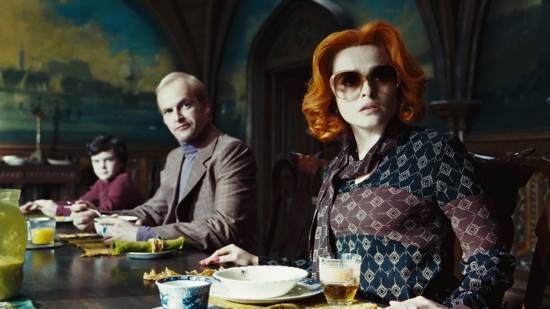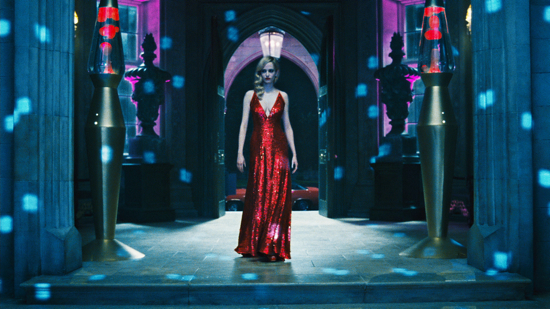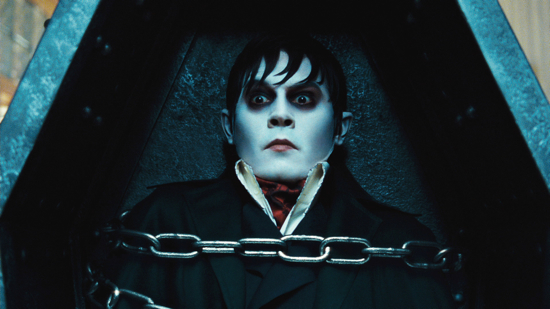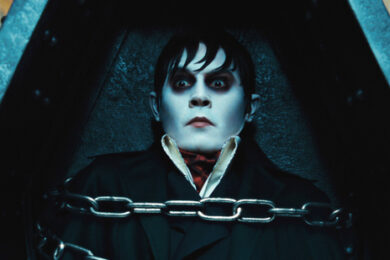Ahh, good old quirky Tim Burton and his remakes and adaptations: where would we be without them? More to the point, what would his career be without them? Well, perhaps respected by people other than an eager group of 13 year olds as confused about their place in the game as he is. With Dark Shadows, he once again drags us through an ‘oh so dark and eerie’ world, but without a care for anything beyond making his cast and settings into a collection of eye candy.
The first decade of his career saw enough money-making hits that one would think someone as inventive as Burton would be set to do whatever he wanted for the rest of his life. Alas, this was not to be the case. Instead, his 1994 bid for artistic respectability (and second Johnny Depp collaboration), the biopic Ed Wood, flopped at the box office, leaving him looking out of a $12 million hole. Burton could at least cling to the fact that Ed Wood had been a critical success, if not a financial once. Unfortunately, his next project would prove to be neither. Heading back into the big budget trenches, he armed himself for Mars Attacks!: not strictly a remake, a sequel or an adaptation, but based on – of all things – a set of trading cards from the 1960s. Following on from the success of previous trading card based films, such as… um… The Garbage Pail Kids Movie. Though not nearly as dire, but arguably as misguided, Mars Attacks! eked out a minimal return.
This was a close enough shave to make the then 38 year old look for a surer commercial bet for his next project, this time taking on a classic slice of American folklore. Previously best known as a fun, if terrifying Disney cartoon from the ’40s, Sleepy Hollow seemed an ideal Burton vehicle. The original had burned its way into the nightmares of children across America, adding new horrors to the ones already lurking behind the trees on a late night walk home. Burton replaced its overt silliness with the dark genius that created a foreboding and terrifying Gotham for the late ’90s (and let’s not forget, injected some more wacky Depp action into proceedings). Sleepy Hollow rode away with saddlebags of cash, nominations and awards. Burton was once again tall upon his horse, though in retrospect this could also be seen as the moment where he lost his head.
He subsequently burst into the millennium with yet another adaptation of a nostalgic classic. Delving into a fanboy past once again, he looked past trading cards, comic books, folk tales and quirky weirdness to set his sights on the highly anticipated remake of Planet Of The Apes. Now, 11 years on, the shadow cast over Burton by this misbegotten project is indeed planet-sized, as fans and pretty much everyone else regard it as the single worst film of his career. Yet it nevertheless did surprisingly well at the box office – what do the critics know, eh?
Back when Burton career began in the conservative 1980s, the landscape of film was fairly colourless. He exploded onto the scene with a vision, style and creativity that hadn’t been seen since the drug-induced art house ventures of the previous two decades. But his once-singular vision has now become his crutch, as throughout the 2000s his work seemed increasingly aimed at younger and more easily pleased audiences. He now seemed content with settling for the usual visual stimulation but with none of the substance. Colourful stripy things and peculiar shapes adorn Burton’s otherwise empty worlds. His style, increasingly so bold and brash, won’t allow room for anything else to be said. In our modern overstimulated world, where everything is continually fighting to be noticed, regardless of content, he continues to flourish. According to IMDb, 2010’s Alice In Wonderland has grossed over a billion dollars, in spite of a rather lacklustre critical response. Given his habit of filling films with familiar faces, you have to wonder whether he’s surrounded himself with yes men and women who fail to challenge a play-it-safe tendency to colour between the lines and never confront his studio backers more than necessary. Burton seems to take a lazy satisfaction in remaining quirkily weird for the sake of it, never daring to wade in too close to his heart for fear of getting stung.
Until now.
Dark Shadows has a long history. It began as a US daytime soap in 1966, the sort that teenagers ran home to watch, a bit like a supernatural Hollyoaks. (Which might not sound that bad, but having seen 13Hrs – starring Gemma Atkinson as a werewolf – I’m fairly certain we’re better off without.) Captain Quirk has professed a great love for the series. Presumably he was one of those ’60s kids eager to sit down in front of a big old box TV set and sink their teeth into this 1225-episode saga. Would this then prove to be a more personal project for Burton?
In Dark Shadows lore, the vampire Barnabas Collins returns after 200 years to reclaim his place in the world, restore the family fortune and do battle with both inner and outer demons, only to become mixed up in a soap opera filled with paranoia, deceit and secrets. The original series ran every day for five years, and as such housed long-winding tales and fully fleshed-out characters, if only thanks to sheer volume of screen time. The soapy theatrics haven’t dated well, but nostalgia operates in a place beyond such earthbound concerns. We think back to these things of our youth and how entranced we were, and with rose-tinted glasses firmly in place, smile and embrace them as though time and perception hold no sway. The original version of Dark Shadows is an intimate, slow-paced affair, while the 1970 film adaptation House Of Dark Shadows is more of an amalgamation, condensing the soap into something more palatable and ultimately pleasurable.

Both of these came from the mind of Dan Curtis, a man who was bound by the confines of a daily soap opera, a shackle that forced him to create characters the viewer had a vested interest in. Tangled plots are a soapy necessity and well-handled, over the top melodrama along with fantastic excursions equalled ratings. As a man whose job was secured only by these ratings, Curtis was forced into taking a calculated risk when early viewing figures proved disappointing. In response, he found room in his already gothic-styled soap for a vampire subplot: enter Barnabas Collins.
This character would become the defining element of Dark Shadows; not just over time, but almost immediately, which must have surprised Curtis as much as anyone. Realising that he could not let down his increasing army of viewers, he had to invent reasons for Barnabas to remain on the show. Thus, the vampire grew a heart and had a love affair, becoming indispensable and integral to the ongoing plot.
Curtis produced a vampire out of self-preservation and dedication to his audience. Thus emerged a truth. Something he could believe in and defend. In stark contrast, it seems unlikely that our purple-spectacled Captain Quirk has as much conviction in what he does anymore. But like the undead, he won’t stop. Instead he rises and turns his gaze to something he supposedly cherished, only to remove everything but a mere sliver of its original charm and power.
Just to make it clear, in no way can you claim that Dark Shadows has anything more than the sort of cult following restricted to a small portion of the American population (that probably ought to get out of the house a bit more, or maybe watch some Hammer productions and get over it). There will probably be a tiny but vocal community crying out that Burton has destroyed their childhood. They are being ridiculous… but they are also right. This is about as far from Dark Shadows as a planet of apes. Burton’s multiple misfires are telling.
The original Dark Shadows was shot in a timeless ’60s and ’70s. There was nothing kitsch or far-out about it; it was simply a product of its era. But within the first five minutes of Burton’s version we are treated to a tour of his hyper-cool, super groovy, time capsule of a film. There’s only one explanation for this: Oh my god! Look how crazy and funny Tim Burton is! Isn’t he wild, honey?!

Art director extraordinaire without question, Burton’s ability to paint a picture and make us believe in these fantasy lands is on a par with Guillermo Del Toro or Terry Gilliam. Many of the awards he has won throughout his career were for art direction, set design, etc. But in his reworking of the gothic world of Collinsport, the visual guru opts to swap his trademarked emo gloom for lava lamps and beads. His expected style is restricted to a few characters and a solitary hilltop, leaving you with a feeling of Tim Burton Lite.
Bringing on board the inexperienced Seth Grahame-Smith (writer of Pride And Prejudice And Zombies) to provide the screenplay is equally peculiar. Grahame-Smith attempts to include nine characters in a story that spans 200 years, throwing in almost as many subplots along the way. As a result, many of the story points either never progress beyond a scene or two or are simply complete wastes of celluloid. For example, Barnabas tries to revive the family’s fortune by extravagantly rebuilding their fishing and canning factory… at which point insert the obligatory Christopher Lee cameo and then forget the whole thing until you need to blow it up at the end. Dropping limp and obvious one-liners wherever and whenever he gets the chance, young Seth’s other writing credits include an upcoming adaptation of his own novel, Abraham Lincoln: Vampire Hunter and, worryingly, Beetlejuice 2, none of which bodes well.
From irrelevant kookiness to a cack-handed Alice Cooper appearance, this complete and utter mess begs the simple question: has Tim Burton finally given up? Will he continue cynically playing off the excitement of children, not knowing what he really wants to say or even how to say it? Conviction. Belief. None of this exists in Burton’s films anymore. Instead, like a needy child, he tugs at your trouser leg and asks, ‘Yeah? Yeah? You like it?’
Personally, I’ll be interested to see what he makes when he’s matured a little; maybe when he hits 25, has had some life experience and finally grown a pair.
Tim Burton’s film opens in cinemas today. A three disc DVD box set Dark Shadows: The Original TV Series is out now through Metrodome. Josh Saco is the Barnabas Collins behind Cigarette Burns Cinema, who host regular London screenings of cult classics and choice obscurities.



